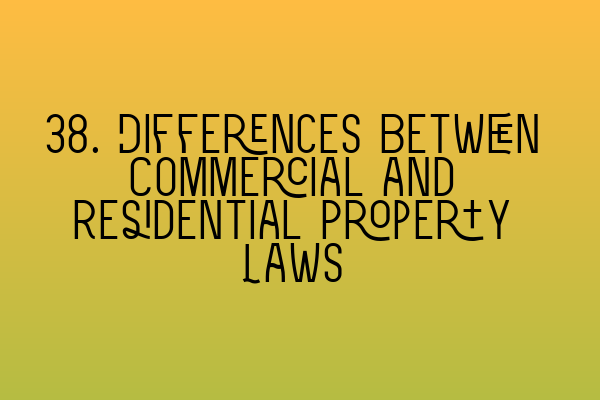Differences Between Commercial and Residential Property Laws
As a solicitor specializing in property law, it is essential to understand the differences between commercial and residential property laws. Each area of law has its distinct rules and regulations, which require a comprehensive understanding to effectively advise and represent clients. In this article, we will explore the key differences between commercial and residential property laws, providing valuable insights for aspiring solicitors and property professionals.
1. Definition and Purpose:
Commercial property refers to real estate used for business purposes, such as offices, retail spaces, industrial units, and warehouses. On the other hand, residential property pertains to properties used for habitation, including houses, apartments, and condominiums. The primary purpose of commercial property is to generate income, while residential property is intended for personal residence.
2. Tenancy Agreements:
Commercial tenancy agreements are typically more complex and longer-term compared to residential tenancy agreements. Commercial leases often involve negotiations on rent, lease term, maintenance responsibilities, and often require additional clauses for tenant improvements, termination options, subletting, and assignment. Residential tenancy agreements, on the other hand, tend to be standardized and regulated by local housing authorities, focusing on tenant rights, rent control, and property maintenance.
3. Legal Considerations:
Commercial property laws are heavily influenced by statutory regulations and legal principles, ensuring fairness, transparency, and protection for both landlords and tenants. Residential property laws, on the other hand, prioritize tenant rights and the landlord’s duty to provide safe and habitable living conditions, often incorporating rent control measures to prevent unfair practices.
4. Insurance:
Commercial property owners typically obtain business-specific insurance policies to protect against risks such as liability, property damage, and business interruption. Residential property owners, on the other hand, opt for homeowner’s insurance, which focuses on personal property coverage and liability for accidents occurring on the property.
5. Planning Permission and Zoning:
Commercial properties often require obtaining planning permission for change of use, construction, or alteration, as zoning regulations are stricter due to the potential impact on the local community and economy. Residential properties are typically subject to fewer zoning restrictions, with planning permission usually required for major renovations or new construction.
6. Financing:
Obtaining financing for commercial properties can be more challenging due to higher loan amounts, stricter lending criteria, and the requirement of comprehensive business plans. Residential properties, on the other hand, are generally more accessible for financing, with various mortgage options available to homeowners.
7. Taxation:
Commercial property is subject to various taxes, including business rates, capital gains tax, and value-added tax (VAT) for commercial leases. Residential property owners also face taxation but generally in the form of council tax, capital gains tax, and stamp duty land tax.
8. Dispute Resolution:
When disputes arise in commercial property matters, the parties often opt for alternative dispute resolution methods such as mediation or arbitration, to save time and costs. Residential property disputes are often resolved through courts or specialized tribunals, especially when it involves eviction or breaches of rental agreements.
Understanding the differences between commercial and residential property laws is crucial to ensure proper legal representation and advice for clients in the real estate industry. Aspiring solicitors should be aware of these distinctions to excel in property law practice.
If you’re preparing for the SQE exams and need additional resources to enhance your understanding of property law, consider checking out these related articles:
– SQE 1 Practice Exam Questions: Test your knowledge and prepare for the SQE 1 exams with practice questions that cover various legal topics, including property law.
– SQE 1 Practice Mocks FLK1 FLK2: Enhance your exam preparation with comprehensive practice mocks specifically designed for SQE 1. These mocks will help you familiarize yourself with the format and content of the exams.
– SQE 2 Preparation Courses: If you’re already on your journey towards becoming a qualified solicitor, these SQE 2 preparation courses will provide you with extensive support and guidance to excel in the exams.
– SQE 1 Preparation Courses: For those starting their journey towards becoming a solicitor, SQE 1 preparation courses offer comprehensive training and materials to equip you with the necessary knowledge and skills.
– SRA SQE Exam Dates: Stay updated with the latest SRA SQE exam dates to plan your preparation and ensure you’re ready for success when the exams are held.
By staying informed about the differences between commercial and residential property laws and utilizing relevant resources to enhance your knowledge, you can confidently navigate the intricacies of property law as a solicitor.
